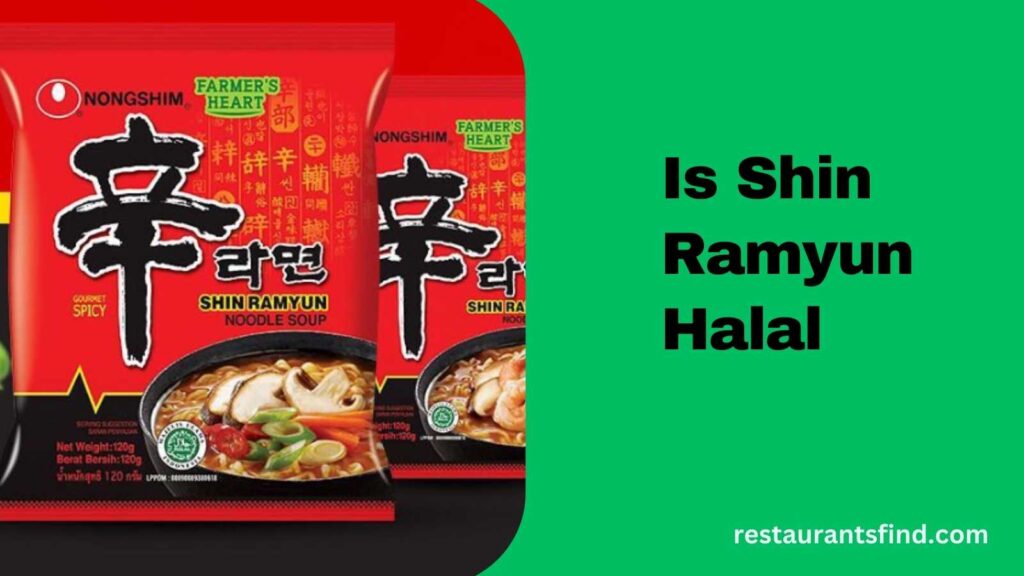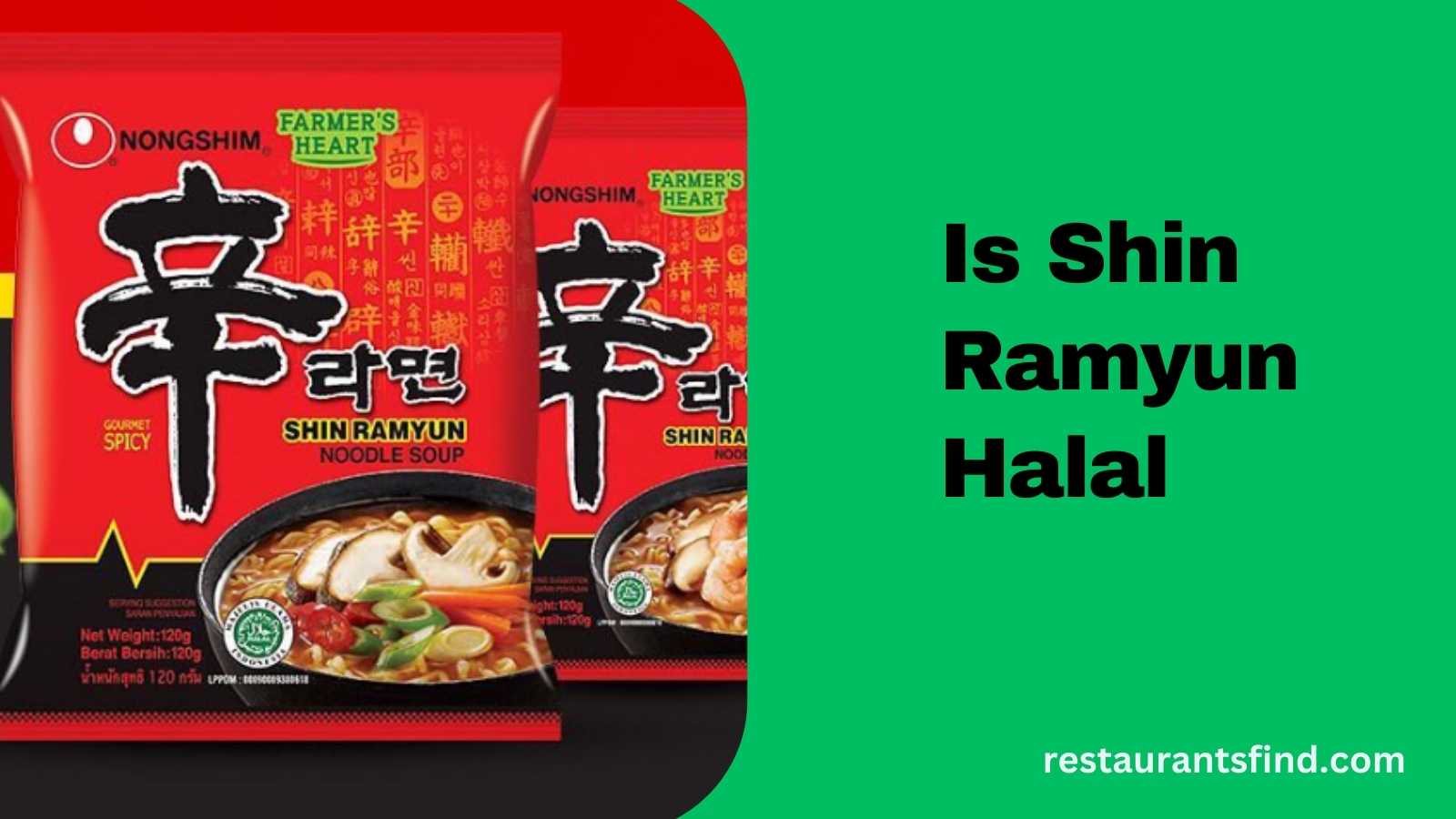Is Shin Ramyun Halal: Shin Ramyun is one of the most iconic instant noodles globally, known for its spicy, flavorful kick. Whether you’re a fan of its fiery broth or its chewy noodles, it’s a go-to comfort food for many. But if you follow halal dietary guidelines, you might be asking: “Is Shin Ramyun halal?”

This is a valid concern, especially since not all products come with clear labeling or official statements. Let’s break this down step by step to help you get a clear answer.
Is Shin Ramyun Halal?
When it comes to deciding if something is halal, we need to evaluate a few key factors. Here’s what you should consider:
1. Is There an Official Statement?
First and foremost, let’s address the elephant in the room: Nongshim, the manufacturer of Shin Ramyun, has not provided a definitive global statement about the halal status of their noodles. If you visit their official website or product pages, you’ll find detailed ingredient lists and product descriptions but no blanket confirmation about whether all variants are halal.
That said, in countries with large Muslim populations—like Malaysia and Indonesia—some Shin Ramyun variants are explicitly labeled as halal-certified. This is typically managed by local certification bodies.
So, while there isn’t a global answer, halal-certified versions do exist in certain regions.
2. What’s in the Ingredients?
The ingredients used in Shin Ramyun are another important factor to consider. The classic Shin Ramyun contains components like:
- Beef or chicken flavoring: These may or may not come from halal sources. For instance, the animal-derived products in the broth might not have been processed according to halal standards.
- Seasoning oils or extracts: Some oils or additives could also pose concerns for halal compliance.
For someone strictly following halal guidelines, these uncertainties might make the standard Shin Ramyun unsuitable unless confirmed otherwise.
3. Check the Halal Mark on the Packaging
This is one of the easiest ways to confirm whether a product is halal. If you’re shopping for Shin Ramyun and notice a halal certification logo on the packaging, you can be assured that it meets halal standards. These versions are typically found in regions like Southeast Asia and the Middle East.
However, if the product lacks any halal marking, it’s best to assume that it may not be halal-compliant.
So, Is Shin Ramyun Halal?
The answer is not straightforward. Some Shin Ramyun products are halal-certified, but others might not be. It depends on the variant and the region you’re purchasing from.
If you follow halal dietary guidelines: Always check for the halal certification logo on the packaging. If it’s not there, you might want to explore other options or brands to stay safe.
What Are Customers Saying About the Halal Status?
Many customers have shared their experiences online regarding the halal status of Shin Ramyun. Here’s what people often report:
- Halal-certified options in Southeast Asia: Shoppers in Malaysia, Indonesia, and the Middle East frequently mention that halal versions are readily available in local stores and even online.
- Ambiguity in other regions: Consumers from countries like the US, UK, and India note the lack of halal markings on the packaging, which can make things confusing.
Online forums, reviews, and product Q&A sections on e-commerce platforms are great resources to find out what other customers have experienced.
Halal-Certified Shin Ramyun
If you’re looking for halal-certified Shin Ramyun options, here are some great choices with their unique features and flavors:
1. Nongshim Shin Ramyun Masala Noodles
This vegetarian variant of Shin Ramyun is halal-certified and perfect for those who prefer a meat-free option. It combines the iconic Shin Ramyun spice with a masala twist, making it a flavorful choice for those who enjoy bold and aromatic spices. The pack contains five servings, making it convenient for quick meals or snacks.
2. Nongshim Stir Fry Shin Ramyun Instant Noodles with Real Chicken Flakes
A non-vegetarian option that’s halal-certified, these noodles offer a rich and spicy stir-fry flavor. The real chicken flakes add a hearty and satisfying touch to the dish, making it a great choice for those who enjoy meat in their noodles. It’s ideal for those who want a more textured and flavorful ramen experience.
3. Nongshim Shin Ramyun – Spicy Instant Noodles Halal Ramen Pack of 20
This pack is perfect for fans of Shin Ramyun who want to stock up. These spicy noodles are halal-certified and offer the classic Shin Ramyun heat and flavor. With 20 servings in one pack, it’s a practical option for families or those who can’t get enough of the bold, spicy taste.
Halal Options in Shin Ramyun or Similar Products
If you’re looking for halal-certified Shin Ramyun or other ramen brands, here are some reliable options:
Halal-Certified Shin Ramyun Variants
- Found in countries like Malaysia, Indonesia, and the Middle East.
- Check online stores like Amazon, Flipkart, or regional platforms for halal-certified versions.
- Always look for the halal logo on the packaging to confirm.
Other Halal Ramen Brands
- Samyang Buldak Ramen (Halal-Certified)
- Known for its extreme spiciness. Halal versions are widely available globally.
- Great alternative if you love bold, fiery flavors.
- Indomie (Halal-Certified)
- Famous for its unique taste and convenience.
- Offers a variety of flavors and is widely recognized as halal.
- Mamee Chef (Halal-Certified)
- A Malaysian brand offering a premium ramen experience.
- Halal certification is a given for all their products.
Final Verdict: Should You Eat Shin Ramyun?
If you’re wondering whether Shin Ramyun is halal, the answer lies in the product variant and where it’s sold. The absence of a universal halal certification from Nongshim means it’s up to you to verify the product you’re buying. Halal-certified Shin Ramyun is available in specific regions, but the standard version might not meet halal requirements.
To stay safe:
- Look for halal certification on the packaging.
- Choose regional halal-certified versions or explore other ramen brands with guaranteed halal status.
With options like Samyang, Indomie, and Mamee, you’ll have plenty of delicious alternatives to enjoy while sticking to your dietary guidelines.
Happy eating!

